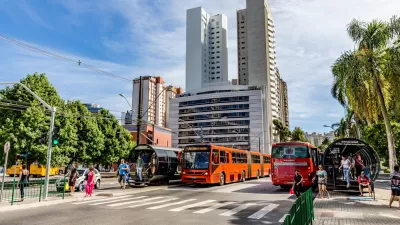Metropolis Magazine talks with bus rapid transit pioneer Jaime Lerner about the gradual global spread of his successful ideas from Curitiba.
"Next year marks the 35th anniversary of a simple but transformative idea in urban planning and transportation: Curitiba, Brazil launched a surface bus system that behaves like a subway. Better than, in some ways. Double-articulated vehicles carry large volumes of commuters, passengers prepay their fare in glazed boarding tubes, designated lanes keep traffic flowing smoothly, and one bus trails the next by one minutes' distance. Curitiba's transit system was established with little municipal investment and at a fraction of the cost of subterranean excavation, and today it carries some 2 million people per day."
Metropolis: "In many respects, the world has caught up to your common-sense approach to sustainability. What events inspired you to embrace those values so early on?"
Jaime Lerner: "It was logic. We realized that sustainability is a whole discussion. Most people think that sustainability is just green buildings. That's very important, but it's not enough. Or that sustainability is new materials, new sources of energy, or recycling, but that's enough, either. When you see that cities are responsible for 75 percent of all carbon emissions, then it's in cities where we can find a more effective answer. It's at the very conception of cities where we have to do this work."
Metropolis: "What is a more ideal plan for battling climate change at an urban scale?"
Jaime Lerner: "One step is to use your car less. Cities will have to provide an alternative public transit. The second is separating garbage, because you can save a lot of energy, even your own. The third is to live closer to work, or to work closer to home. And this is the key issue, because our cities have more and more separation."
FULL STORY: Learning from Lerner

Alabama: Trump Terminates Settlements for Black Communities Harmed By Raw Sewage
Trump deemed the landmark civil rights agreement “illegal DEI and environmental justice policy.”

Study: Maui’s Plan to Convert Vacation Rentals to Long-Term Housing Could Cause Nearly $1 Billion Economic Loss
The plan would reduce visitor accommodation by 25% resulting in 1,900 jobs lost.

Planetizen Federal Action Tracker
A weekly monitor of how Trump’s orders and actions are impacting planners and planning in America.

Parklet Symposium Highlights the Success of Shared Spaces
Parklets got a boost during the Covid-19 pandemic, when the concept was translated to outdoor dining programs that offered restaurants a lifeline during the shutdown.

Federal Homelessness Agency Places Entire Staff on Leave
The U.S. Interagency Council on Homelessness is the only federal agency dedicated to preventing and ending homelessness.

Restoring Northern India’s Himalayan ‘Water Temples’
Thousands of centuries-old buildings protect the region’s natural springs and serve as community wells and gathering places.
Urban Design for Planners 1: Software Tools
This six-course series explores essential urban design concepts using open source software and equips planners with the tools they need to participate fully in the urban design process.
Planning for Universal Design
Learn the tools for implementing Universal Design in planning regulations.
Caltrans
Smith Gee Studio
Institute for Housing and Urban Development Studies (IHS)
City of Grandview
Harvard GSD Executive Education
Toledo-Lucas County Plan Commissions
Salt Lake City
NYU Wagner Graduate School of Public Service



























